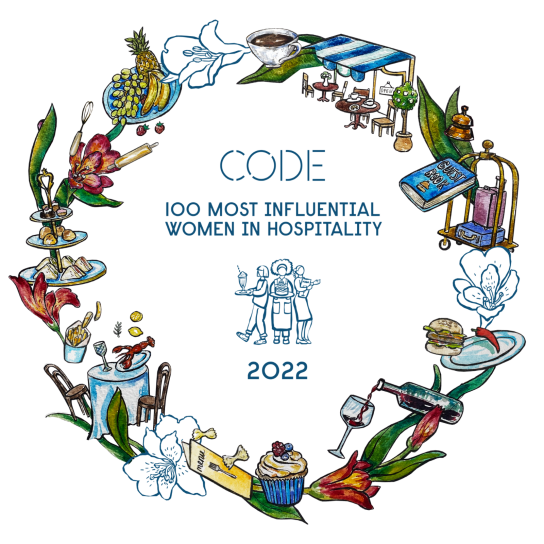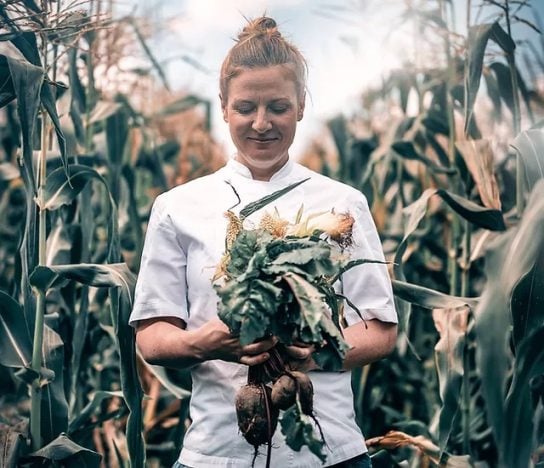
Sustainability Award
sponsored by
Winner: Chantelle Nicholson

Nicholson’s career has taken her to highly respected kitchens – The Savoy and Marcus Wareing at the Berkeley among them. Now, following the success of her Covent Garden restaurant Tredwells, Nicholson is running things her own way. At Apricity, her new restaurant in Mayfair, she places sustainability and a love for the planet at the very core of the menu and practices. Her book, Planted, champions seasonal veg-forward cooking, and she remains one of the most respected voices for sustainability in the industry.
CODE stopped by Apricity for a chat with Nicholson about winning the Most Influential in Sustainability award for 2022.
How are you? How has Apricity been doing?
Oh my gosh – touch wood – it’s been amazing. We had two amazing reviews on the same day, Giles Coren and Grace Dent, both in the Saturday papers a few weeks ago, and things just went bonkers afterwards. It’s amazing. I’m very grateful.
You’re passionate about sustainability. That’s what this whole place is built on. When did you start getting interested in that, and what drove you to it?
It was probably inherent from growing up in New Zealand. I was surrounded by beautiful country, but also amazing produce, and eating seasonally was what we had to do because we’re such an isolated country. I remember, when I was little, getting excited about the first of the asparagus season, the first strawberries.
My family had a stone fruit orchard in Central Otago – still do. I saw first-hand to how much work goes into growing things, but also how much better it can taste. My uncle, for example: the way his fruit tastes is just insane. When you have an apricot in this country, it doesn’t even compare. It’s that real kind of deliciousness. And I think appreciating the oceans and minimising impact was inherent in my growing up.
As a family, we didn’t waste things; we always appreciated what we had. The older I got, and the more independent and autonomous I got, I realised that was what was important to me. It’s been solidified in the last five or six years, and then with COVID it became more pronounced. I prioritised this time to reflect about what I wanted to do.
Where did you learn the techniques and processes that you incorporate into Apricity now?
Most of that is pretty self-taught. I’ve taken inspiration from places like Silo, or Doug [McMaster]’s book that talks about what you can use instead of clingfilm. And foraging – I started doing that during lockdown. I was walking outside along the canal, and it piqued my interest, so I learned more about it. Eve, my head chef, and I, and Beth my GM, have worked together for a long time. It’s been about thinking through how we do things, especially in the kitchen. We take something that traditionally would have gone in the bin and ask: is there a way we can use it? Can we use it in a cocktail, or use it in a different way? I think once you start, it gets quite compelling to keep going.
Has it been difficult to introduce new ways of doing things into the kitchen?
We started when we reopened post-Covid over at Tredwells. And then when I did All’s Well, it was a bit of a test – not that I realised it at the time. There have definitely been challenges that we’ve wracked our brains over, and it’s always a balancing act. You can’t do everything. It’s step by step.
Can you talk a bit about your supply chains? How do you make sure that they align with the Apricity’s ethos of regeneration and zero waste?
It’s about having a direct relationship with the supplier, rather than there being a bit of haziness around where things come from. For instance, we work with a vertical farm called Crate to Plate, and the founder delivers for us. We’ve been to see them. Going to visit suppliers is really important. We’ve been to see where our mushrooms grow in North London. That way we can kind of sense check it.
And it’s also through the context. I’m a member of the Pasture for Life association, and we found our dairy supplier through them. The meat we get is through The Ethical Butcher, and we know that their ethos is the same as ours, so we’ve got the element of trust with them. It’s the same with our seafood supplier, and the small farms we work with in Kent, and East Sussex – again, we know it’s harvested, and we know the guys that run it.
It’s all about relationships. There’s an element of trust and it’s not linear. We don’t say ‘This is what we want.’ It’s more like: ‘What have you got? And how can we help you as well, if you’ve got things you can’t sell? Can we find a way to use them?’
What do you think about greenwashing? Words like ‘sustainable’, ‘hyper-seasonal’ and ‘regenerative’ get thrown around a lot, without very much accountability. How do we counteract that trend?
If people ask questions, you can really tell whether businesses are invested in it. I think asking about supply chains is a big one. But you can also look and see what’s on the menu – if they’re serving, for example, asparagus in winter. Carbon emissions is another one – actually working out what your carbon emissions are. That is huge. I haven’t even figured it out yet, we’re still going through the process. But I think it’s just looking for those little touch points.
What can chefs and restaurants do right now that would have the most impact on the environment?
One of the things that upsets me the most is going into restaurants, and they have one bin for everything – all the recycling all the food waste, everything. You cannot say that you’re a sustainable restaurant, or that you’re working towards that, when this is what you’re doing. The amount of excess stuff that’s not used – it’s just not thought about. Even things like portion sizing: if you’re getting a lot of food coming back then, reduce your portions. You save money, you save time.
That’s the one I always advocate for. I think 65 per cent of our waste is incinerated, so it doesn’t go to landfill, it doesn’t biodegrade; it gets burned. And that’s emissions going into the air. If you’re burning plastic, and if you’re burning food, it’s really bad.
There are also amazing collection facilities. It’s more cost effective to have different bins because recycling costs less than general waste. Our coffee grounds get collected, which then go to be made into bricks. Or there are people are making cosmetics out of them. There are always interesting ways of doing things. It may take you a little bit of time to set it up, but it’s not a huge amount of time in the scheme of things. And you can show that actually, there is a cost benefit, and it’s a much easier win.
Apricity is a shining example in the industry, but it is only one place. Do you have a vision for creating a larger impact in hospitality?
I would love it to be a bit more of a community. We’re tiny, but the whole reason for doing this was to try to create case studies that make it easier for everybody else.
When you’re a small operation, you don’t have a sustainability team or a purchasing team, you’ve got to do all that work yourself and fit it in with everything else. I want to find better ways of doing things. Moving away from clingfilm for us was really big, and now we don’t even think about it. I go into kitchens that have it, and I think, ‘Oh my gosh, what is that?’.
There are things like refillable spirits, and there’s loads of amazing people doing all kinds of things. It would be great to be able to create a directory, or a how-to guide. We’re doing that for the set-up – creating a case study. For example, I did loads of research into sound absorption. The ones we have are made from mycelium, a mushroom, but look like wool or synthetic. In the beginning, the whole thing was sort of a minefield, but now I’m able to say: this is what I can recommend. The tables and chairs I bought from tram sheds. We upcycled all the sinks, which I got from reclamation yards.
All these little things – you just want someone say: ‘This is what you need to do. These are the best light bulbs use. This is the best water filter system, so you don’t have the output of glass bottles. Creating a how-to guide to make it easier for everybody else: that was my intention with it.
What advice would you have given yourself when you first started 17 years ago?
Reflecting back, I didn’t know what I was getting myself into. I was very naive, which was the best thing, or I wouldn’t have done it. I went to work at Savoy Grill, which has this amazing tradition and history, but I didn’t know that, and it was actually really beneficial.
That is my advice: don’t overthink things, and take each day as it comes. Just go for it because you have nothing to lose.
And right now, the opportunities are probably greater than they’ve ever been. Find somewhere that you think aligns with what you want to do, and your ethos and just email them. Anyone right now will embrace it with open arms. It’s such a varied career path that you can do anything. Literally, you can do anything. Every single facet of the industry is different, from cooking, to wine, to cocktails, to finance, to marketing, to operations – it literally it covers everything.
A message from the award sponsor
Haeckels is delighted to sponsor the Sustainability award as part of CODE’s 100 Most Influential Women in Hospitality 2022.
Haeckels exists as an amplifier of the natural world and as a community problem solver. We are driven by trying to solve the waste problem – be that through our use of waste natural resources in our products, or presenting packaging solutions to our community that are fully recyclable or compostable.
As a business, we’re afraid to stand still. This is why we have a symbiotic bond with the hospitality industry. As well as working closely with hospitality, it too as an industry has to continuously evolve and never more so does it need to focus on sustainability as a core pillar of its purpose.
It’s for that reason that we are delighted to work with CODE Hospitality on both supporting hospitality and the amazing women across the industry doing such brilliant things. We would like to congratulate all of the entries in this year’s 100 Most Influential Women in Hospitality and the winner of the Sustainability award.
Read this year’s full list of our 100 Most Influential Women in Hospitality here

